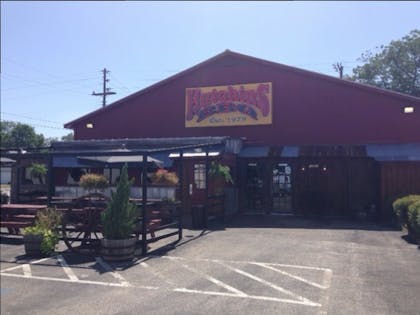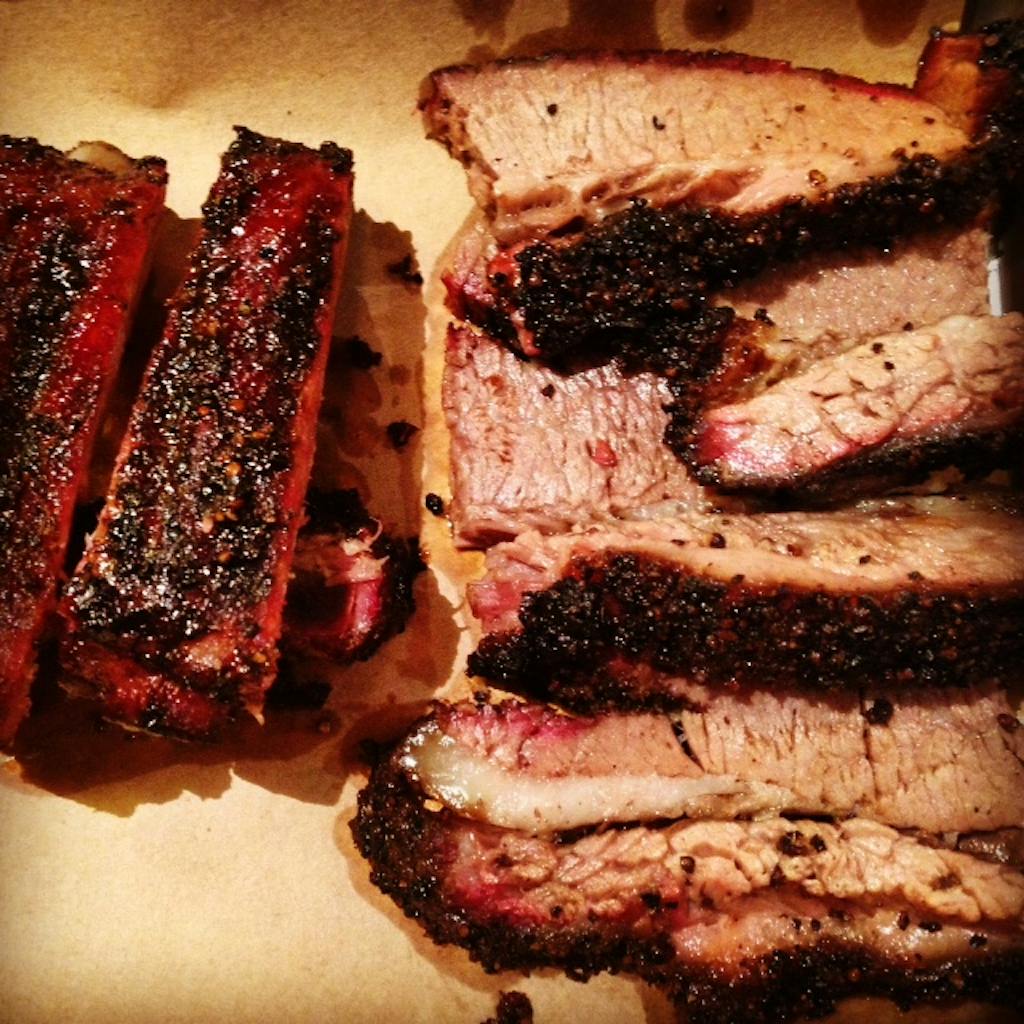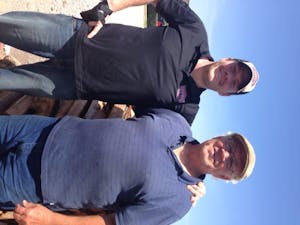 Owner/Pitmaster: Hutchins BBQ; Opened 1978 (current location 1991)
Owner/Pitmaster: Hutchins BBQ; Opened 1978 (current location 1991)
Age: Roy 65, Tim 33
Smoker: Indirect Heat Wood-Fired Pit
Wood: Pecan and Oak
Roy Hutchins started his family in the barbecue business in 1978 with a tiny smokehouse in Princeton, Texas. Since then his sons have been involved in running multiple barbecue joints across North Texas, and his youngest son Tim took over the flagship Hutchins BBQ in McKinney in 2005. Since then there have been tragedies to overcome, but also great rewards. In just a few short years, Hutchins went from barely making a blip on the barbecue radar, to becoming one of the most popular and well respected barbecue joints in the area.
I sat down with Roy and Tim both at Hutchins BBQ just after lunch. They had stories galore to share, and even a few notes of wisdom. Roy comes in daily even though he’s mostly retired. Tim is now the one spending the long hours tending the pits in hopes to make Hutchins BBQ one of the best barbecue joints in the country.
Daniel Vaughn: Roy, when did you start Hutchins BBQ?
Roy Hutchins: I started Hutchins BBQ back in 1978 out in Princeton, Texas about six miles east of here. I closed down there in 1991 after we opened this building.
DV: What made you move to McKinney?
RH: I worked for King’s Barbecue back in high school just down the road here. I respected Jody King very highly. He, along with Johnny Pleasant [of Johnny’s Log Cabin in Greenville], were the most respected people in North Texas barbecue at the time. After King went out of business in 1990 or 1991, this building came open. I called my son who had just opened a joint in Wylie. I told him “McKinney is a hot town for barbecue and King is out. Let’s go for it.”
DV: What was this building before?
RH: This building was built in around 1963. It was a Bill’s Ton of Burger. I came here when I was a kid. Then it was a Hickory House, owned by Phil Taylor. He had a Bewley pit. I came within and inch of buying this place back in 1975. It was a mistake when I didn’t buy it back then.
DV: And King’s was where you learned to barbecue?
RH: Uh-huh. I started there when I was fourteen. I fell in love with it. That place had atmosphere and smoke. He had an old piano… When he went out, I went and bought all of his tables, pictures, and décor. We had a lot of that stuff hanging up here throughout the years.
Tim Hutchins: The pit table back there where we trim our briskets is from King’s Barbecue.
DV: Did your sauce recipe come from King’s?
RH: I was looking for that flavor. Sam Cole was up in Paris, Texas and I sold him briskets. He wouldn’t tell me his recipe, but he would tell me his basis. He said “Let me tell you what good barbecue sauce is. When that barbecue sauce hits those taste buds, you want sweet, bitter, and hot all at the same time. When you come up with a sauce that’s sweet, bitter, and hot then you’ve got a good sauce.” I just kept working on it. I used vinegar for the sour, pure cane sugar for the sweet and a little cayenne and black pepper for the hot.
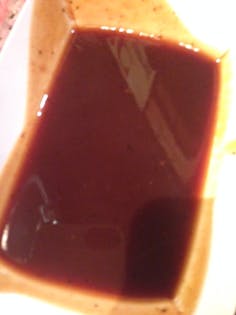
DV: How much sauce do you go through?
TH: We make it in three gallon batches, and I probably make ten batches a day. On the weekend it’s fifteen. The thing about our sauce, in this area about eighty percent of customers want sauce.
DV: Roy, did you tell me that you were in a band while you worked at King’s?
RH: All the guys that worked there, the meat cutters, we called ourselves the King’s Five. We’d go down to King of the Road on Saturday night and play music.
DV: So, when you opened your own place, what did it look like? What was it called?
RH: It was Roy’s Smokehouse. It was a little barbecue house on the side of the road. Right on the end of it was a 10’ x 10’ room. We lived in that room for eight months. I was selling hanging beef to stores and barbecue houses for Hensley Packing Company out of Denton, Texas too. I rebuilt my pit, and I’d open up on Fridays and Saturdays. I built a bigger room that was about 16’ x 30’. We lived there for four years. We shared a kitchen with the barbecue joint. Tim was born in a barbecue house.
TH: That’s all I remember.
DV: How many of you were living in that little house?
TH: There were five of us. I was the youngest at three.
DV: Is it still there?
RH: Yeah. I live there. I built a larger house there.
DV: On the bright side, you at least had the use of a commercial kitchen in your house.
TH: I wouldn’t call it a commercial kitchen. His pit was in the kitchen and would catch the rafters on fire.
RH: This is a fact. I couldn’t afford a Bewley pit so I got the plans and had one built just like it. It wasn’t insulated so it cooked pretty hot. One day that thing caught on fire. The whole pit was on fire. I went and opened those doors. It was blazing. It scorched my lungs. I had tinsel and Christmas decorations on the other end of the room. It was so hot they melted. I forced those doors shut, got my water hose and sprayed the pit until I got the fire down. Then the rafters were on fire.
DV: Did you call the fire department?
RH: Nope. I put it out and kept on operating the next day.
DV: You were open the next day?
RH: Oh yeah. I couldn’t afford not to be open.
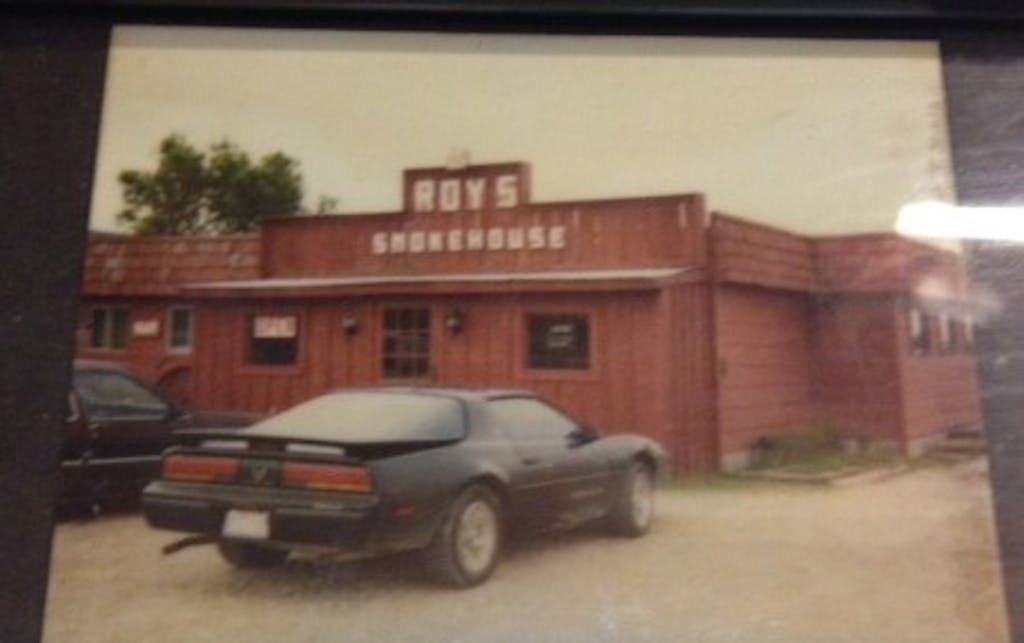
TH: Then there was the tornado that came by and tore off the roof.
RH: This is a fact. I was adding to my kitchen. I was rinky dinking some two-by-fours together. All of a sudden it got bad and the wind started blowing. I grabbed Tim. Just as we went through that door the whole roof came off. It landed in the field across the street.
TH: Dad was doing barbecue before it was cool. At Roy’s Smokehouse he always left all the fat on.
RH: What we did was cook it and left the fat on. When I sliced it I’d ask if you wanted the fat or not, and trim it off and put it to the side if you didn’t want it. What gave my flavor was getting it sizzling in the pit. After I had it cooking good, I would slow the process down.
DV: When did you get Tim working in that kitchen?
TH: I was fourteen washing dishes for four dollars an hour every Saturday. I worked forty hours a week during high school. I got married at nineteen, so as soon as I graduated high school, it was right back here for sixty hours a week.
DV: And what were your duties here back then?
TH: At nineteen I was the assistant manager. My brother Tracy was the main manager. Then I fell in love with the pits.
DV: You love the cooking?
TH: Oh yeah. That’s what I love. As soon as I knew this was my career, that’s what I did. The cooking. I’ve been here ever since.
RH: He did great. He just got in there and learned it.
DV: Tim, now you own Hutchins. When did that transfer take place?
TH: My brothers ran other stores and I ran this one. We had Randy White’s in Frisco and a Hutchins out in Greenville. At the end of 2005 is when we separated and went our own ways.
RH: My other son sold out Randy White’s in Mesquite and now it’s BBQ Tavern.
DV: Now you’re back in business with one of your brothers in Frisco, correct?
TH: I bought him out. I needed kitchen space, especially for catering. Right now my brother Trey is my general manager.
DV: Now that younger brother has taken over and introduced a new way of cooking the barbecue, was that a problem?
TH: Not really. It is what it is.
DV: Roy, what’s your role here now? Are you retired?
RH: No. I still come in everyday. I’m happy when I’m working. Tim’s got a good business here. This has always been a good money store.
TH: We don’t let him back near the pits, but he still comes in to tell me my restaurant is a joke [laughing].
DV: Tim, what was the transition like when you took over in 2005?
TH: I went through a divorce in 2006. I brought Dustin [the meat cutter] on in 2007.
RH: He could’ve gone down or gone up. He chose to go up.
TH: We also had hundreds of thousands of dollars in debt to get rid of too. It worked out.
DV: At what point did you think you decided to change things up here?
TH: I took a barbecue tour in 2010, and Dustin and I went out in 2011.
RH: He came back, and he said “dad, I’ve eaten the best brisket I’ve ever had in my life.” It was at Franklin Barbecue in Austin.
TH: I think Franklin changed barbecue. He was one of the first to go out there and sacrifice profits to start making the best. It’s made everybody step their game up. He deserves to be on that pedestal.
DV: Do you still go on those trips?
TH: I’m going with my girlfriend on one later this year.
DV: How did those barbecue trips affect your cooking?
TH: We were making strides, then the fire happened in 2012. That changed our whole philosophy on things. I had just been making tiny tweaks before then. Once the fire happened I said “the hell with it.” I just wanted to put out the best food I could put out. Anyway, we were down for five months. It looked bad for a while. We had city meetings where it looked like it might not happen.
DV: What was the issue?
TH: The property line in the back. My dad built over the property line.
RH: I built six feet over the line.
TH: It thought we might have to tear it down and rebuild. They finally let us build right on the property line.
RH: When we opened back up, they just lined up.
TH: Then it was the Texas Monthly list, then we got voted best in Dallas. It’s just been boom, boom over the last two years.
DV: What things had you changed about the way you were cooking when you reopened?
TH: I changed meat brands. I got with Matt down at Local Yocal and started serving a premium brisket and started serving a better rib. It’s just been across the board. My food costs skyrocketed, but I didn’t care. The spices alone…People underestimate what black pepper costs, but I spend $1200 per month on black pepper. It’s unbelievable. Also, if you’re burning real wood you’ll go through a lot. We got through six cords per month. I just revamped the whole process. We use pecan and oak on the briskets now. I used to use hickory and mesquite.
DV: How much brisket do you go through?
TH: A hundred twenty cases per week.
DV: Right now I think you’re as popular as ever. Do you think you’ve hit your stride?
TH: No. There’s always room for improvement. I want my employees to be trying to build a legacy here. As soon as you feel comfortable, then you’re dead. Our goal here is to be the best, period. One of these days we want to be considered one of the best in America. If somebody comes to visit America and they didn’t eat Hutchins, I want them to feel like they totally missed out. Hopefully, we can do that in twenty years or so.
DV: You’re open all day. Do you feel like that’s a disadvantage that you can’t just open up, and close when you sell out?
TH: That’s not who we are. I want to make it where the blue-collar guys can come in here and get lunch in thirty minutes. I want to serve it all day every day. It takes strategies and effort. We take briskets off the smoker every two hours. I feel like the food right now is about 80% of where I want it to be.
DV: You talked about building a legacy here, but you’re also carrying on a legacy from your dad.
TH: There are still people who come in and tell me “you’re a joke compared to your dad.”
DV: But then you get named to the Top 50 in Texas. Did that come out of the blue for you?
TH: Yes. That was goal, but I thought we might get it the next round. Dustin was watching on Twitter. He called me when we saw. We had a good party that night. Business shot up about twenty-five percent. It was crazy. We all worked overtime. I was killing myself, but it paid off.
DV: At this pace, is this something you can keep doing for a long while?
TH: I don’t ever plan on quitting. Ever.


